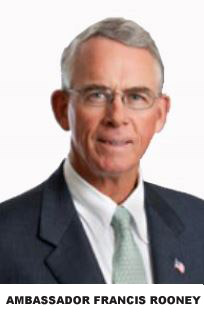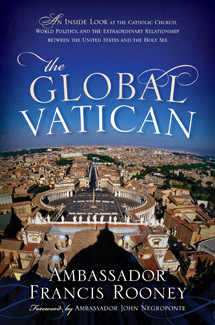 |
WWW.FRANCISROONEY.COM
Ambassador Francis Rooney served as U.S. Ambassador to The Holy See
from 2005 to 2008, appointed by President George W. Bush and is the
author of the book The Global Vatican, which provides an inside look
at the Catholic Church, world politics, and the extraordinary
relationship between the U.S. and The Holy See. He is a frequent
guest commentator providing analysis on national politics and
foreign affairs, especially as related to Latin America and the
global diplomatic influence of the Holy See. He has appeared on
national broadcast and in print publications including USA Today,
U.S. News & World Report, CBS This Morning, Fox News, The Washington
Post, NPR’s All Things Considered, CNN, Time Magazine, National
Catholic Register, National Review, MSNBC Morning Joe, The Hill, Ave
Maria Radio, Newsmax, One America Network and the Huffington Post.
Rooney actively performs research and advocacy on foreign affairs,
political strategy and economic issues. He is a trustee of The
Center for the Study of the Presidency and Congress, a member of the
Council of American Ambassadors, a director of The Trust for the
National Mall and Crossroads GPS, all in Washington D.C. He
previously served on the 20/20 Committee and Washington Advisory
Council for The Center of International Studies.
He is an international business leader with interests in the
banking, energy, real estate development and construction sectors.
He is chairman of Rooney Holdings, Inc., a diversified investment
company, and Manhattan Construction Group, which is engaged in the
general building, road, bridge, pipeline and specialty construction
segments. He serves on the boards of Mercantil Commercebank, Coral
Gables, Florida, Helmerich & Payne, Inc., and Laredo Petroleum,
Inc., Tulsa, Oklahoma, and Vetra Energy Group, Bogota, Columbia. He
is also a member of the International Advisory Board of the Panama
Canal Authority, Republic of Panama. He previously served on the
boards of the Diplomatic Council of Securing America’s Future Energy
(SAFE), and the Young President’s Organization (YPO), where he
served as the International President from 1997 to 1998. He is a
founding member of the International Business Forum of Oklahoma.
Rooney currently serves on the Republican Party of Florida (RPOF)
Executive Finance Board, the Jeb Bush for President Florida
Executive Finance Council, and is a co-chair of Catholics for Jeb
Bush. He is also a member of the campaign’s Religious Liberty
Advisory Committee. He previously served on the Romney for President
National Finance Council (2011-2012), and as the national finance
chairman for Speaker John Boehner (2010-2015). He has served on
executive and finance committees for the RGA and the NRSC.
Rooney is dedicated to advancing higher education initiatives as a
board member of The University of Oklahoma College of International
Studies, the Rooney Center for American Democracy at the University
of Notre Dame and the Florida Gulf Coast University Foundation. He
previously served as a trustee at the University of Tulsa and served
on several university committees including Faculty and Curriculum,
Athletics, Advancement, Building and Grounds, and Student Life.
Ambassador Rooney is a graduate of Georgetown University (A.B. 1975)
and Georgetown University Law Center (J.D. 1978), and has honorary
degrees from the University of Notre Dame (2006) and the University
of Dallas (2010). He is a member of the District of Columbia and
Texas Bars and has a U.S. Coast Guard 100 Ton Masters license
(Sailing Endorsement). He is married to Kathleen Collins Rooney;
they have 3 children and two grandchildren.

From the
centuries-long prejudices against Catholics in America,
to the efforts of Fascism, Communism and modern
terrorist organizations to “break the cross and spill
the wine,” this book brings to life the Catholic
Church’s role in world history, particularly in the
realm of diplomacy. Former U.S. ambassador to the Holy
See Francis Rooney provides a comprehensive guide to the
remarkable path the Vatican has navigated to the present
day, and a first-person account of what that path looks
and feels like from an American diplomat whose
experience lent him the ultimate insider’s perspective.
Part memoir, part historical lesson, The Global Vatican
captures the braided nature of religious and political
power and the complexities, battles, and future
prospects for the relationship between the Holy See and
the United States as both face challenges old and new.
Click to purchase book |